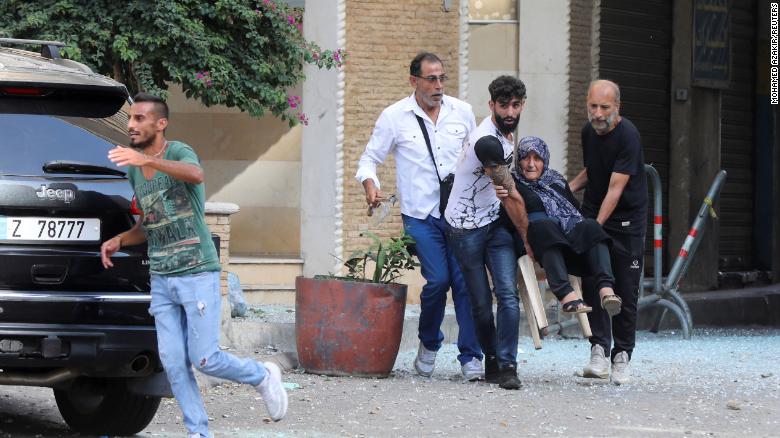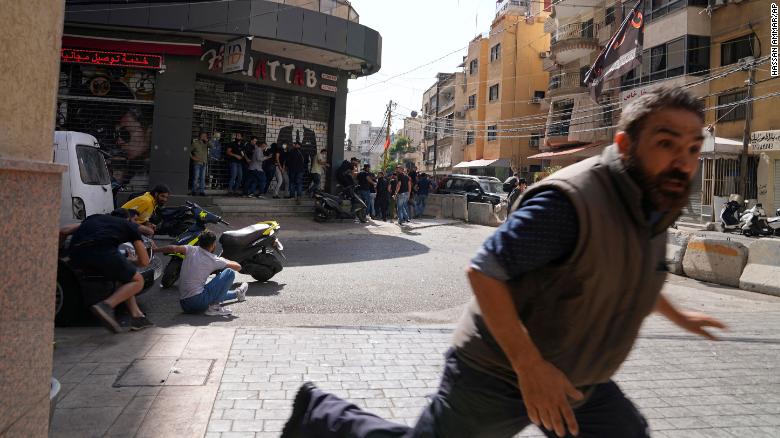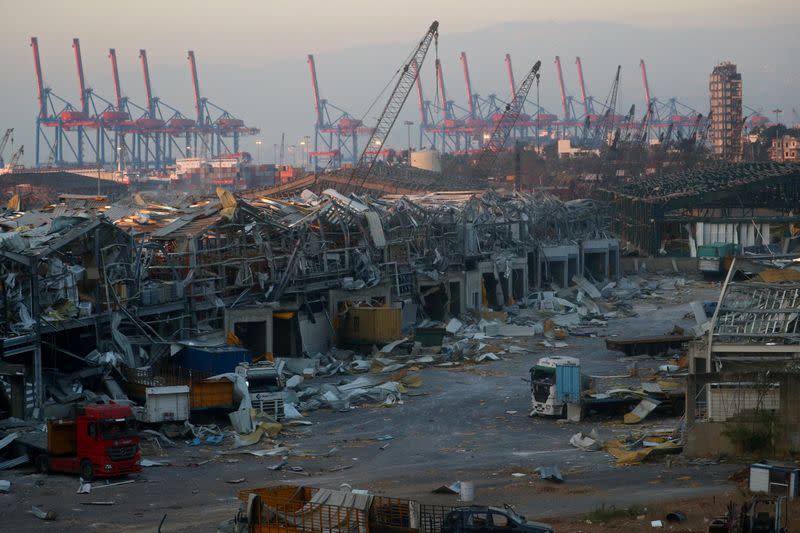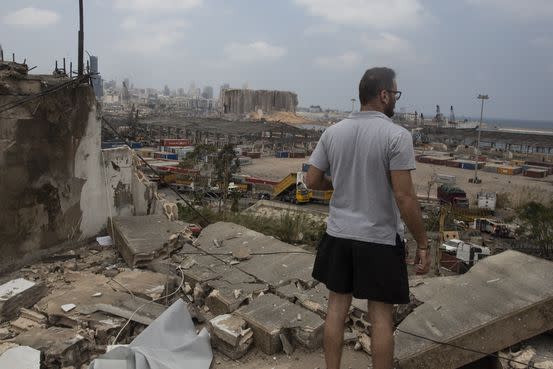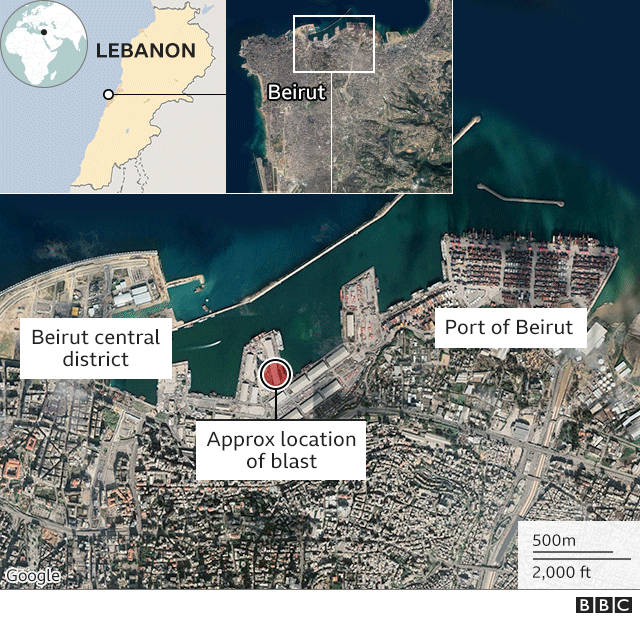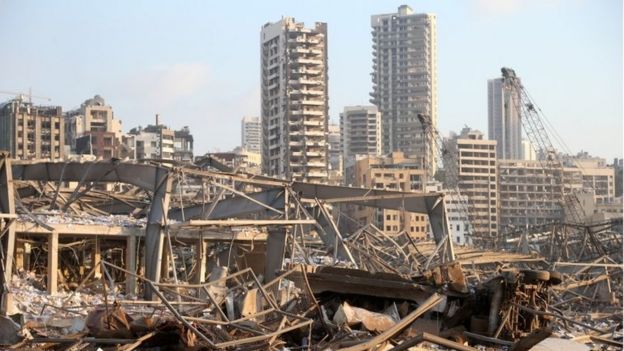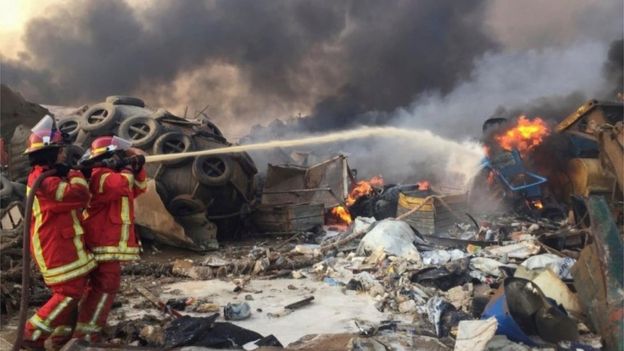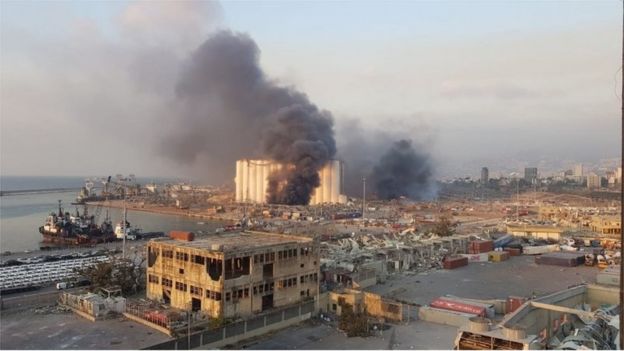Furious Lebanese vow new protests over deadly mega-blast
Issued on: 09/08/2020 -

"Prepare the gallows because our anger doesn't end in one day," warned one message circulating on social media in response to Tuesday's earthquake-strength blast of a huge pile of industrial chemicals - AFP

Beirut (AFP)
Lebanese protesters enraged by official negligence blamed for Beirut's enormous and deadly explosion vowed Sunday to rally again after a night of street clashes in which they stormed several ministries.
"Prepare the gallows because our anger doesn't end in one day," warned one message circulating on social media in response to Tuesday's earthquake-strength blast of a huge pile of industrial chemicals.
The calls for renewed protests came as French President Emmanuel Macron in Paris was to oversee a UN-backed virtual donors conference to raise aid for Lebanon, a country already mired in a painful economic crisis.
In Beirut, the fury on the streets has further shaken the embattled government of Prime Minister Hassan Diab, which saw its first cabinet resignation when the information minister, Manal Abdel Samad, quit Sunday.
"After the enormous Beirut catastrophe, I announce my resignation from government," she said, apologising to citizens for having failed them.
The revelation that Lebanese state officials had long tolerated a ticking time-bomb in the heart of the capital has served as shocking proof to many Lebanese of the rot at the core of the state apparatus.
The death toll from the explosion of a long-neglected pile of ammonium nitrate stood at 158 people, with 60 still reported missing, and a staggering 6,000 wounded, many by flying glass as the shockwave tore through the city.
The blast, whose mushroom cloud reminded many of an atomic bomb, left a 43-metre (141 foot) deep crater at Beirut's port, said a security official citing French experts working in the disaster area.
The mood was one of grief and fury in Beirut, a day after many of the dead were laid to rest and when thousands demonstrated in the biggest anti-government rally the country has seen in months.
- Teargas, rubber bullets -
The country's worst peace-time disaster has reignited a protest movement against the reviled ruling elite that first flared last October but had then faded amid economic hardship and the coronavirus pandemic.
As tensions have again escalated, the army Saturday used teargas and rubber bullets to clear hundreds of protesters from the central Martyr's Square, once more the epicentre of Lebanon's protest movement.
The street violence left 65 people injured, according to the Red Cross, with footage circulating online showing some demonstrators having sustained severe injuries.
In a new tactic, demonstrators temporarily occupied the foreign ministry building before being forced out by the army three hours later.
Protesters, some brandishing nooses, also stormed the economy and energy ministries and the Association of Banks, widely hated for cash shortages and asset freezes, before they were pushed back out by soldiers.
Rescuers meanwhile kept digging through the rubble of toppled buildings as hopes slowly faded of finding more survivors from the colossal blast that shook the country and was felt as far away as Cyprus.
The explosion was recorded by the American Institute of Geophysics as equivalent in power to a magnitude 3.3 earthquake.
It was triggered by a fire in a port warehouse, where a huge shipment of hazardous ammonium nitrate, a chemical that can be used as a fertiliser or as an explosive, had languished for years, according to authorities.
- 'Crime against humanity' -
Embattled Prime Minister Diab said Saturday he would propose early elections to break the impasse that is plunging Lebanon ever deeper into political and economic crisis.
"We can't exit the country's structural crisis without holding early parliamentary elections," Diab said in a televised address, promising a draft bill Monday.
At least six lawmakers have also quit since the August 4 explosion.
The head of Lebanon's Maronite church patriarch Beshara Rai joined the chorus of people pressing Diab's entire cabinet to step down over a blast he said could be "described as a crime against humanity".
The protesters demand the wholesale removal of Lebanon's ruling class, which they see living in luxury while millions endure job losses, deepening poverty, power blackouts and garbage mountains piling up in the streets.
Working with the mostly youthful protesters are a group of retired army leaders whose state pensions have been decimated by the collapse of the Lebanese pound.
Politics in multi-confessional Lebanon is dominated by former warlords from the 1975-1990 civil war who years ago exchanged their military fatigues for suits, or by their offspring and nephews.
While there Sunni Muslim, Christian and myriad other groups, the most powerful is the Shiite Hezbollah militia and political movement, which dwarfs the state in manpower and military strength.
The protesters charge that Lebanon's elite is fighting over the spoils of government, beholden to their personal and sectarian interests rather than the good of the nation.
© 2020 AFP
Lebanese protesters enraged by official negligence blamed for Beirut's enormous and deadly explosion vowed Sunday to rally again after a night of street clashes in which they stormed several ministries.
"Prepare the gallows because our anger doesn't end in one day," warned one message circulating on social media in response to Tuesday's earthquake-strength blast of a huge pile of industrial chemicals.
The calls for renewed protests came as French President Emmanuel Macron in Paris was to oversee a UN-backed virtual donors conference to raise aid for Lebanon, a country already mired in a painful economic crisis.
In Beirut, the fury on the streets has further shaken the embattled government of Prime Minister Hassan Diab, which saw its first cabinet resignation when the information minister, Manal Abdel Samad, quit Sunday.
"After the enormous Beirut catastrophe, I announce my resignation from government," she said, apologising to citizens for having failed them.
The revelation that Lebanese state officials had long tolerated a ticking time-bomb in the heart of the capital has served as shocking proof to many Lebanese of the rot at the core of the state apparatus.
The death toll from the explosion of a long-neglected pile of ammonium nitrate stood at 158 people, with 60 still reported missing, and a staggering 6,000 wounded, many by flying glass as the shockwave tore through the city.
The blast, whose mushroom cloud reminded many of an atomic bomb, left a 43-metre (141 foot) deep crater at Beirut's port, said a security official citing French experts working in the disaster area.
The mood was one of grief and fury in Beirut, a day after many of the dead were laid to rest and when thousands demonstrated in the biggest anti-government rally the country has seen in months.
- Teargas, rubber bullets -
The country's worst peace-time disaster has reignited a protest movement against the reviled ruling elite that first flared last October but had then faded amid economic hardship and the coronavirus pandemic.
As tensions have again escalated, the army Saturday used teargas and rubber bullets to clear hundreds of protesters from the central Martyr's Square, once more the epicentre of Lebanon's protest movement.
The street violence left 65 people injured, according to the Red Cross, with footage circulating online showing some demonstrators having sustained severe injuries.
In a new tactic, demonstrators temporarily occupied the foreign ministry building before being forced out by the army three hours later.
Protesters, some brandishing nooses, also stormed the economy and energy ministries and the Association of Banks, widely hated for cash shortages and asset freezes, before they were pushed back out by soldiers.
Rescuers meanwhile kept digging through the rubble of toppled buildings as hopes slowly faded of finding more survivors from the colossal blast that shook the country and was felt as far away as Cyprus.
The explosion was recorded by the American Institute of Geophysics as equivalent in power to a magnitude 3.3 earthquake.
It was triggered by a fire in a port warehouse, where a huge shipment of hazardous ammonium nitrate, a chemical that can be used as a fertiliser or as an explosive, had languished for years, according to authorities.
- 'Crime against humanity' -
Embattled Prime Minister Diab said Saturday he would propose early elections to break the impasse that is plunging Lebanon ever deeper into political and economic crisis.
"We can't exit the country's structural crisis without holding early parliamentary elections," Diab said in a televised address, promising a draft bill Monday.
At least six lawmakers have also quit since the August 4 explosion.
The head of Lebanon's Maronite church patriarch Beshara Rai joined the chorus of people pressing Diab's entire cabinet to step down over a blast he said could be "described as a crime against humanity".
The protesters demand the wholesale removal of Lebanon's ruling class, which they see living in luxury while millions endure job losses, deepening poverty, power blackouts and garbage mountains piling up in the streets.
Working with the mostly youthful protesters are a group of retired army leaders whose state pensions have been decimated by the collapse of the Lebanese pound.
Politics in multi-confessional Lebanon is dominated by former warlords from the 1975-1990 civil war who years ago exchanged their military fatigues for suits, or by their offspring and nephews.
While there Sunni Muslim, Christian and myriad other groups, the most powerful is the Shiite Hezbollah militia and political movement, which dwarfs the state in manpower and military strength.
The protesters charge that Lebanon's elite is fighting over the spoils of government, beholden to their personal and sectarian interests rather than the good of the nation.
© 2020 AFP
Lebanese protesters storm ministry buildings as anger over Beirut explosion grows
Issued on: 08/08/2020 -

Demonstrators take part in a protest, following Tuesday's blast, in Beirut, Lebanon August 8, 2020. © REUTERS/Issam Abdallah
Lebanese protesters forced their way into government ministries in Beirut and trashed the offices of the Association of Banks in Lebanon on Saturday as shots rang out in increasingly angry demonstrations over this week's devastating explosion.
More than 110 people were wounded during demonstrations in central Beirut on Saturday against this week's huge explosion and 32 people were taken to hospital, Lebanese Red Cross officials told local media.
Police confirmed shots and rubber bullets were fired during the clashes. It was not immediately clear who fired the shots. Riot police shot dozens of teargas canisters at protesters, who hit back with firecrackers and stones.
With security forces focused on a large gathering at the Martyrs' Square protest hub, a group led by retired army officers snuck into Lebanon's foreign ministry and declared the building a "headquarters of the revolution".
The stunt, which marked a new development in the strategy of a protest camp whose October 17 uprising had lost steam lately, was facilitated by the damage the port-blast shockwave had inflicted on the building.
But the takeover lasted barely three hours.

Beirut demonstrators showed 'level of rage' not yet seen in 10 months of protests
Large army reinforcements using rubber bullets and tear gas drove out the roughly 200 protesters, who only had time to chant celebratory slogans against the government and burn a portrait of President Michel Aoun.
At one point, protesters had stormed or taken over four key official buildings.
"We are officially at war with our government," said activist Hayat Nazer, as tear gas filled the air in downtown Beirut.
"This is war."
'Lebanon is ours'
Separate groups of protesters also stormed the economy ministry, the Association of Banks in Lebanon and the energy ministry before being forced out by the army shortly afterwards.
The latter is the focus of particular anger from the population, which has in recent months been subjected to worse-than-ever power cuts due to the de facto bankruptcy of the state.
"They ruled Lebanon for 30 years, now Lebanon is ours," said one protester speaking on live Lebanese television broadcasts.
"We entered the energy ministry and we are here to stay."
The Association of Banks in Lebanon, another obvious target for protesters who have routinely nicknamed their rulers "the government of banks", was ransacked, an AFP reporter said.
By 10:30 pm local time. however, protesters had been dispersed and security forces deployed across the city, where the broken glass and rubble from Tuesday's disaster mixed with the smoking remains of a night of rage.
The rallies claimed a human toll too, with one policeman falling to his death following an "assault" by "rioters", the police said. A policeman at the scene said the officer died when he fell into an elevator shaft in a nearby building after being chased by protesters.
Dozens of people wounded during the violence also needed treatment in hospitals already bursting with the injured from Tuesday's blast and coronavirus patients.
"We are staying here. We call on the Lebanese people to occupy all the ministries," one demonstrator said on a megaphone, as new protests erupted against the political leadership blamed for a massive explosion that killed more than 150 people in the capital this week.
Possible early elections
Speaking at a press conference on Saturday evening, Lebanon's Prime Minister Hassan Diab said he would request early parliamentary elections to defuse an escalating political crisis following the catastrophic explosion at the port of Beirut.
"We cannot get out of this crisis without early parliamentary elections," he said, reading a statement. He added he was not to blame for the country's deep economic and political woes.

Lebanese Prime Minister Hassan says he will call for early elections following the blast
The US Embassy in Beirut said the US government supported the demonstrators' right to peaceful protest and urged all involved to refrain from violence.
The embassy also said in a tweet that the Lebanese people "deserved leaders who listen to them and change course to respond to popular demands for transparency and accountability".
2/2 We support them in their right to peaceful protest, and encourage all involved to refrain from violence.— U.S. Embassy Beirut (@usembassybeirut) August 8, 2020
Explosion felt in neighbouring countries
A fire at Beirut port on Tuesday ignited a stock of ammonium nitrate and triggered an explosion that was felt in neighbouring countries and destroyed entire sections of the city.
The blast killed more than 150 people and injured 5,000 while leaving more than a quarter of a million people without homes. Spectacular videos of the disaster show a mushroom-shaped shockwave that swept from the port through the city.
According to the health ministry, more than 60 people are still missing.
"After three days of cleaning, removing rubble and licking our wounds ... it is time to let our anger explode and punish them," said Fares Halabi, a 28-year-old activist.
Thousands of people poured into Beirut’s main square, where they set up symbolic nooses to hang politicians whose corruption and negligence they blame for Tuesday's explosion at the Port of Beirut.
The lack of political change combined with a stinging economic crisis and the coronavirus pandemic all but snuffed out the revolutionary movement – until this week.it

Anti-government protests are continuing in Beirut
"Today is the first demonstration since the explosion, an explosion in which any one of us could have died," said Hayat Nazer, an activist who has contributed to solidarity initiatives for blast victims.
"This is the biggest warning for everyone now that we don't have anything to lose anymore. Everyone should be in the streets today, everyone," she told AFP.
>> ‘Beirut is destroyed, my heart is broken’: Locals in despair over Lebanon blast
International aid
Two days after a landmark visit by French President Emmanuel Macron, diplomatic activity was intensifying to organise international support for the disaster-hit country ahead of a Sunday aid conference to be co-hosted by Macron and the United Nations. The Arab League has also pledged support.
Three senior diplomats were in Beirut Saturday in a show of solidarity with the disaster-hit city, where 300,000 people were made temporarily homeless by the port explosion.
The first to meet top officials was Arab League chief Ahmed Aboul Gheit. Turkish Foreign Minister Mevlut Cavusoglu was also expected as was the president of the European Council, Charles Michel.

'Major protests' expected in Beirut Saturday amid residents' anger over port-area explosion
The president and prime minister of Lebanon have promised a government investigation but, more than a mere case of negligence, many Lebanese see the blast as a direct result of high-level corruption. Few Lebanese trust that the leadership would incriminate its own in an investigation chaired by some of the country's top officials.
Aoun, however, has rejected calls for an international independent investigation into the blast.
A total of 21 people have been detained so far, including Badri Daher, director-general of Lebanon's customs authority.
>> The strange history of the chemical cargo that caused the Beirut blast
'Wake-up call'
Lebanon defaulted on its debt earlier this year and the current leadership has so far consistently failed to address the economic emergency and agree on an international rescue package despite intense Western pressure.
Analyst Nasser Yassin, of the Issam Fares Institute for Public Policy and International Affairs, said Lebanon's leaders were clearly seeking to take advantage of the situation.
"The fear is that the authorities will benefit from this great disaster and from the international and Arab attention they are getting," he said.
Activist Hayat Nazer said the current crisis should not turn into a chance for the political elite to get a new lease of life but instead give fresh impetus to a drive for change.
Daily newsletterReceive essential international news every morningSubscribe
"I think it's the last wake-up call for people," she said.
"We need to save each other, we need to clean our country, to rebuild it, and to completely disregard that we have politicians," Nazer said.
"It's not just about protesting in the streets. We can make a change on a daily basis, the revolution is part of our lives, we can apply it every day."
(FRANCE 24 with AFP, AP and Reuters)

